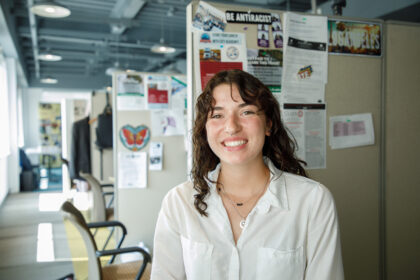‘To heal as a society, we have to help with housing’
Emily Rooney ’24 spent the summer entrenched in the Massachusetts housing system — juggling phone calls, tracking down applications, and advocating for clients while trying to understand their unique needs and circumstances. The sociology major interned at Justice 4 Housing, a Boston-based grassroots nonprofit that seeks to dismantle housing discrimination and houselessness, particularly for people impacted by domestic violence and incarceration.
As a rental assistance intern for Justice 4 Housing’s Hands on Defense program, Rooney primarily worked as a housing navigator, assisting clients who are experiencing housing discrimination or instability based on their criminal history.
“Without proper housing, it’s challenging to find a job or reunite with family,” says Rooney. “If we’re going to find a way to heal as a society, we have to help with housing.”
Rooney had been using Clark services like the Career Connections Center to look for internship opportunities in the nonprofit field. She found Justice 4 Housing on the Handshake platform and was excited about the opportunity to work one-on-one with clients. The Robert J. S. Ross Summer Social Justice Internship Stipend and funding from ClarkCONNECT helped Rooney cover the costs of housing, gas, and food throughout the summer.
Leslie Credle founded Justice 4 Housing in late 2019, roughly a year after she was released from federal prison. Like Credle, many Justice 4 Housing employees have been incarcerated and/or found themselves shut out of housing opportunities. The organization helps residents find housing statewide, addresses the root causes of recidivism and houselessness, and works to abolish discriminatory federal, state, and local housing policies.
Credle sees housing as the No. 1 barrier to reentry after incarceration. Throughout the five years she was in prison, she heard about mothers unable to reunite with their children because of their inability to find a place to live. In Massachusetts, landlords can refuse to rent to people with criminal records.
“When I got to the halfway house, I noticed disparities between being privileged and unprivileged,” says Credle, a homeowner who had a place to go upon reentry. “My peers were stuck in the halfway house because they had homes they couldn’t return to, or because they were homeless. Some were forced into shelters or sober homes. That was a catalyst that motivated me.”
Credle says some people insisted to her that housing discrimination was too huge an issue to tackle. She turned to interns to help disseminate resources to people in need.
“Interns get the experience of helping communities they normally would not have contact with and learning about why individuals are incarcerated in the first place,” says Credle. “I think our society does not fully understand that a lack of community resources contributes to high incarceration rates.”

Rooney worked with six clients. A typical day included helping clients fill out and file applications, and checking on the status of previous applications. She worked with clients to navigate housing lotteries and waitlists, and connected them with landlords who are open to renting to the formerly incarcerated.
“The system can be extremely overwhelming,” she acknowledges. “Learning how to connect with people and assist them in whatever way they need has been eye-opening.”
Rooney constantly hunted for options that best suited her clients, which could be affordable, subsidized, or low-income housing. “People know best what they need,” Rooney says, “and I know I want to help them and learn their stories.”
As clients wait for housing, Rooney and colleagues also connect them with wraparound services like mental health care, food stamps, and jobs and job training.
Riley Smith supervised Rooney throughout the internship and guided her on how to conduct difficult conversations with empathy.
“We offer a unique opportunity for interns to learn more than just technical and data skills,” says Smith. “Our interns learn how to engage with clients, meet them where they’re at, and approach conversations with a harm-reduction and trauma-informed framework. Interns walk away with a broader understanding of the community members we serve and the systems that keep them from reaching their full potential.”
Rooney’s interest in finding resources for the unhoused population dates to high school, when she participated in a fundraiser for a local shelter, which included sleeping outdoors. That one winter night made an impact.
“It was a very humbling experience and gave me perspective about my privilege and the privilege that most people with stable housing take for granted,” she recalls.
In Class, Status, and Power, a course taught by Professor Jack Delehanty, Rooney studied the systematic forces that shape inequality, including zoning policies and the eviction cycle. Studying at Stellenbosch University in South Africa gave her a global perspective on housing crises.
“It was very interesting to learn about their system and come back here and work in ours. Apartheid disrupted the layout of the country, and spatial segregation still exists,” says Rooney. “South Africa struggles with informal settlements that often lack running water, sanitation, and proper electricity.”
These experiences have encouraged Rooney to pursue a graduate degree in Community Development and Planning. After graduation, she wants to continue in social or community work.
“Creating one-on-one connections with people helps with anything I’ll do,” she says. “I believe that the more we meet people from different backgrounds and learn their stories, the better off we’ll all be.”


